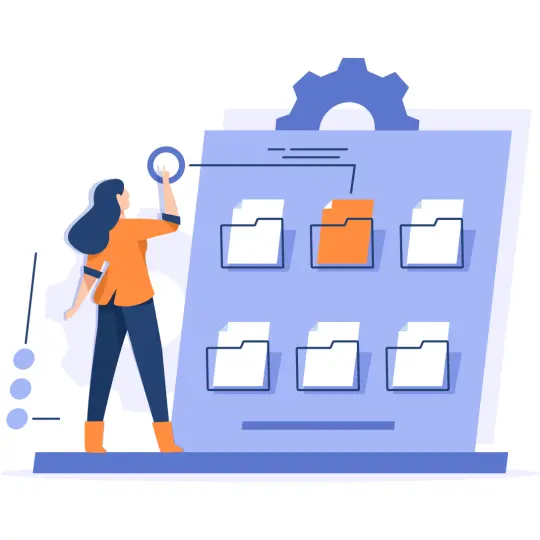Digitize Your Legacy Records
Legacy records refer to historical documents, files, and data stored in outdated formats such as paper, microfilm, floppy disks, or early digital formats. These records can span decades and often hold vital information for organizations, including financial statements, employee records, contracts, medical files, and government archives. Over time, these documents become harder to access, prone to damage, and can take up valuable physical storage space.
With your current legacy systems, we can merge them into one new system, combine databases, move data between systems, and more.
Common Types of Legacy Records
Legacy records come in many forms and formats, spanning decades of organizational history. Below are the most common types of legacy records we’ve worked with that businesses and institutions need to digitize to modernize their information management processes:
Paper Documents
One of the most common forms of legacy records, paper documents can range from contracts, invoices, and legal agreements to administrative forms, employee records, and handwritten notes. Over time, paper deteriorates and becomes difficult to store and organize, making digitization an effective way to preserve and manage this information.
Microfilm & Microfiche
Microfilm and microfiche were widely used throughout the 20th century for the compact storage of large volumes of records, such as newspapers, books, and archival documents. However, specialized equipment is required to view them, and the technology is now outdated. Digitizing these records ensures that they remain accessible without the need for aging hardware.
Audio & Video Tapes
Cassette tapes, VHS tapes, reel-to-reel audio, and other analog formats store crucial audiovisual content but degrade significantly over time. Specialized equipment is often required to access these materials, and as they age, the information on them becomes less stable. Converting them to digital formats ensures their preservation and accessibility.
Floppy Disks & Other Outdated Digital Media
In the early digital age, many organizations stored their files on floppy disks, CDs, and other now-outdated digital storage media. These devices have a limited lifespan, and modern computers often cannot access them without adapters. By transferring this data to contemporary digital formats, organizations ensure that critical information is not lost.
Handwritten Notes & Letters
Historical documents like handwritten letters, diaries, or meeting notes may carry significant personal, historical, or operational importance. These delicate records often degrade rapidly, so digitizing them preserves both the content and the original appearance of the writing for archival purposes.
Customized Solutions
We understand that every organization’s records are unique. We tailor our services to meet your specific needs, whether it’s large-scale scanning, data extraction, or converting rare formats.
Top-Tier Security
We follow stringent data protection protocols to ensure the safety and confidentiality of your sensitive records. From encryption to secure transfers, we maintain the highest standards of compliance with privacy regulations.
Modern Methods
Using advanced scanning and optical character recognition (OCR) technology, we ensure that your digital records are accurate, searchable, and easy to integrate into your existing systems.
Efficiency & Peace of Mind
Our digitization experts work closely with you to ensure minimal disruption to your operations. We can handle large volumes quickly, ensuring that your transition to digital is seamless and hassle-free.
Frequently Asked Questions (FAQs)
Legacy records are typically older documents and data stored in outdated formats. This includes paper files, microfilm, microfiche, cassette tapes, floppy disks, and early digital formats. These records often hold historical, legal, or operational value but are difficult to access due to the medium they are stored on.
Why should I digitize my legacy records now?
Over time, physical records degrade, becoming prone to damage, loss, or theft. By digitizing them, you ensure their long-term preservation, improve access and searchability, enhance security, and save on physical storage costs. With evolving compliance regulations, having your records digitized also ensures you’re prepared for audits or legal requests.
Is the digitization process secure?
Absolutely. At Consentia, we prioritize the security of your records at every stage. We implement secure transfer methods, use encryption technology during digitization, and comply with privacy regulations like HIPAA, PIPEDA, and GDPR to protect sensitive information.
How long does the digitization process take?
The timeframe depends on the volume and condition of the records, as well as the specific formats. During our consultation phase, we’ll assess your records and provide a detailed timeline tailored to your project’s needs.
What happens to my physical records after digitization?
That’s up to you! After digitization, we can return your original documents, securely store them, or offer secure destruction services, ensuring sensitive information is disposed of properly.
What if my legacy records are damaged or in poor condition?
Consentia’s digitization experts are trained to handle fragile and damaged records carefully. In many cases, we can restore and enhance degraded documents during the scanning process. We’ll assess the condition of your records during the consultation phase and recommend the best approach.
What digital formats can you provide?
We can deliver your records in a variety of formats including PDFs, TIFFs, JPEGs, and even specialized formats tailored to your document management or archival systems. We’ll work with you to determine the best format for your organization.
Ready to Digitize Your Legacy Records?
Don’t let your valuable historical data collect dust or deteriorate. Take the first step toward modernization today with Consentia’s professional digitization services.
